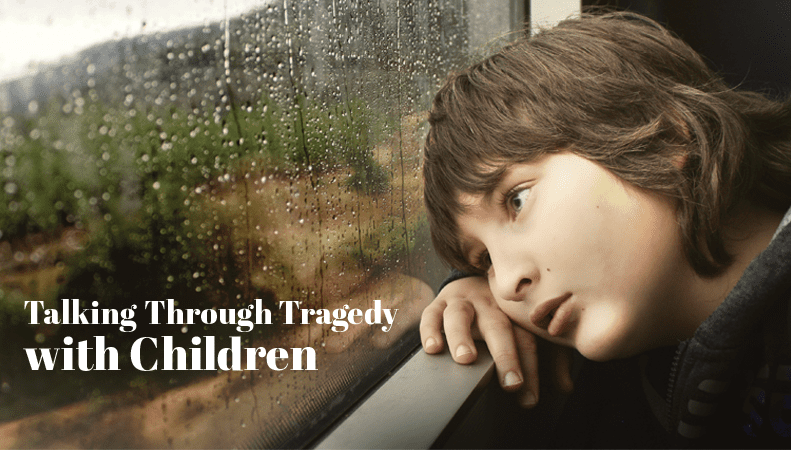What do you do when tragedy strikes? How do you talk with children about death and pain – things we often want to shield our children from for as long as possible?
Dealing with tragedy and death is never easy, yet it is a very real part of life. Many of us are uncomfortable talking about these topics, especially when it involves children, because we aren’t sure what we think about death.
A healthy first step for adults is to examine your own emotions about what has happened. It may be tempting to try to hide your emotions from your children, but in reality it is better to express emotions in healthy ways. Children sense when adults around them are not doing well. Teaching children how to talk about tough situations, how to express their feelings, and how to have hope for the future gives them powerful tools to use throughout life.

While every child is different and there is no perfect way to approach these conversations, here are a few guiding principles that can help:
1. Keep the Conversation Age-Appropriate
Whether we realize it or not, children have some awareness of death. Many have seen death on television shows, a dead animal by the side of the road, or a dead bug. They may have even lost a family member. When a tragedy occurs, the best thing a parent can do is speak to children on their level to help them process the information.
2. Be Truthful and Concrete About the Situation
Be honest about what has happened. Avoid euphemisms that can cause confusion – hearing that a loved-one “went to sleep” might lead to misunderstanding.
3. Answer Questions After Clarifying
Sometimes we can make assumptions that lead to sharing far more information than necessary.
4. Help Them Talk About Their Feelings
Sad, hurt, angry, and afraid are emotions that are neither good nor bad – they just are. One of the most valuable things you can do is help your child identify and deal with their feelings.
5. Be Patient and Comforting
Children, especially young children, may ask questions repeatedly as they try to process what has happened. They also may become clingy and need extra comfort, try to be patient with them.
6. Limit Time Spent in Front of Media
The deeper mind does not differentiate what is happening in real time from what has happened to someone else. Watching details about a tragic event numerous times can be traumatic for your children. Additionally, children don’t necessarily discern that they are watching the same event repeatedly, making things scarier.
7. Explaining “Why?”
Events happen in this life that we will never be able to explain. Don’t feel like you have to have all the answers. If your child asks you why bad things happen, you can answer honestly – that you don’t know.
8. Your Role as the Parent
Your role as parent is to reassure your child that you are there to keep them safe and to make sure their needs are met. Tell them you love them and that you’re going to get through it together.
9. Seeking Professional Help
You know your child better than anybody. Don’t be afraid to seek professional help during times of loss.
Needs of a Grieving Child:
- Information that is clear and understandable at their development level
- To be reassured that their basic needs will be met
- To be involved in planning for the funeral and/or anniversary
- To be reassured when adults grieve intensely
- Help with exploring fantasies about death, afterlife, and related issues
- To be able to have and express their own thoughts and behaviors, especially when different from adults
- To maintain age-appropriate activities and interests
- To receive help with “magical”/irrational thinking
- To say goodbye to the deceased
- To memorialize the deceased
Source: Hospice.net
Locate a Children’s Mental Health Specialist:
Ask your primary care provider or visit aacap.org or apa.org.


Julie Baumgardner, MS, CFLE
President and CEO, First Things First

